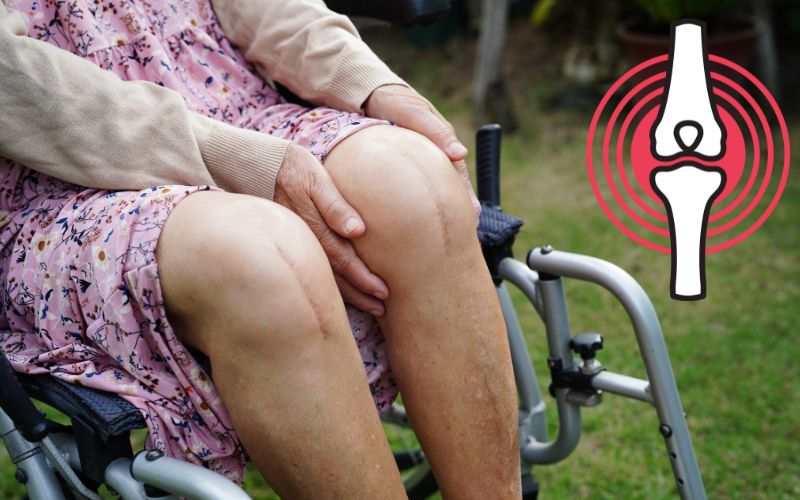If you or someone you know recently got knee replacement surgery, you must be familiar with the problems experienced after the surgery to take immediate action or visit the doctor if needed. Complications of knee replacement surgery might be caused by surgery or a malfunctioning implant. Loss of knee mobility and discomfort are frequent consequences. More serious risks that necessitate revision surgery include joint replacement infection, unexpected bleeding into the knee joint, and prosthesis loosening.
In this comprehensive guide by Top Knee replacement surgeon in Delhi, Dr. Simon, you will learn seven common problems after knee replacement surgery and how to deal with them.
Common problems after knee replacement surgery
Pain
Pain and swelling are normal after knee replacement surgery, and most people can resume daily activities with reduced pain after three to six weeks. However, a small percentage of patients experience chronic knee pain after surgery.
To manage the pain, doctors may prescribe pain relief medicines. However, there are other non-medical treatments, such as:
- Aromatherapy
- Activity
- Back rub or massage
- Effleurage (gentle massage)
- Shower
- Breathing and relaxation
- Changes to your environment
- An ice pack or frozen gel pack
- Lifting the afflicted leg above the level of the heart
- Using topical creams and patches on the knee
Infection
Although rare, infections after knee replacement surgery can be serious and may require multiple surgeries. About 1 in 100 patients may develop an infection after knee replacement surgery, which can occur in the wound or deep around the artificial implants. Infections can develop during the hospital stay, after going home, or even years later.
Infections are usually treated with antibiotics. Doctors may perform further surgeries if the infection spreads deep into the knee joint. Deep infections that are caught early are curable with a surgical washout of the joint called debridement
Blood clots
Blood clots, or deep vein thrombosis (DVT), are a possible complication after knee replacement surgery due to changes in blood flow and clotting patterns. DVTs are a serious condition that can block blood flow in the veins, causing swelling, pain, and permanent damage to the legs. If a DVT breaks away, it can travel to the lungs and cause a pulmonary embolism, which can be fatal.
To avoid this, doctors recommend Wearing compression stockings and starting physical exercises.
Implant loosening
Knee replacement implants are usually firmly fixed during surgery but can become loose over time. The cause of loosening isn’t always clear, but some factors that may contribute include:
- High-impact activities
- Excessive body weight
- Wear the plastic spacer
- Scar tissue buildup
- Surgical technique
- Implant type and fit
- Implant alignment
If an implant loosens, another surgery may be needed to replace the loose or worn parts.
Clicking sound
It’s normal to hear or feel clicking in your knee after knee replacement surgery, especially after a replacement. It is caused by the metal and polyethene parts of the knee replacement touching each other, and it’s usually not a cause for concern. The clicking will usually get quieter over time, but there may always be some clicking. If the clicking aggravates, you can consider seeing a physical therapist to help you build muscle and maintain flexibility.
Nerve damage
Nerve damage is a rare but serious complication of total knee arthroplasty (TKA) surgery. It can be temporary or permanent and affects the motor and sensory branches of the nerves. Nerve damage can occur during surgery when surgeons cut, stretch, or put pressure on nerves in the leg or around the joint. Tourniquets used to limit blood flow in the leg can also put pressure on nerves and cause damage.
Cold therapy can help ease pain after surgery by numbing nerve endings. You can use an ice or frozen gel pack for 15 to 20 minutes or as directed by your surgeon.
Stiffness
Stiffness following knee replacement surgery is a normal aspect of the rehabilitation process. It might restrict movement and make it difficult to carry out regular chores. Stiffness can have many causes, including Preoperative stiffness, Failing to care for your new joint properly, Abnormal scar formation, and Some pre-existing system medical conditions such as diabetes.
If you are unable to stand or stretch your knee, consult your doctor for a diagnosis and proper treatment.
Consult Knee Replacement Surgeon near you
These are some of the common problems associated with knee replacement surgery. If you are looking for a top-tier orthopaedic facility to perform a knee replacement or arthroscopy? You must contact Dr Simon Thomas, Delhi’s best knee replacement surgeon.
Dr Simon Thomas treats all knee conditions, no matter how difficult they are. Either acute or chronic the surgeon employs cutting-edge technology and surgical procedures, including robotic-assisted complete knee replacement.
When you choose Dr Simon Thomas, you’re selecting a knee replacement surgeon in Delhi who is committed to your complete rehabilitation and well-being. His treatment guarantees that you receive the best possible treatment at each stage of your orthopaedic journey.













